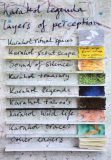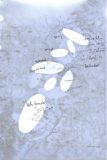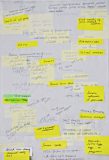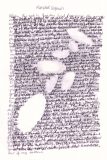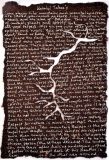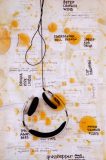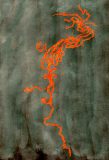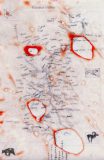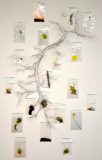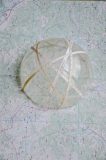- veroveringen
- manifestaties
- debat
- buik
- 11ha
- weer/wind
- plein
- een moment
- vallei
- wijk
- eiland
- tentoonstelling
- heelal
- straat
- uren
- huid
- park
- verbindingen
- licht
- tekenmachine
- kaart
- initiatieven
- week
- verborgen bijzonderheden
- maand
- polder
- stad
- geur
- stadsdeel
- onderzoek
- nacht
- dag
- seizoen
- zwaartekracht
- wand
- samenwerkingen
- ruimte
- 1:50
- publicatie
- oog
- chronologie
The landscape speaks
Mapping the Karakol valley
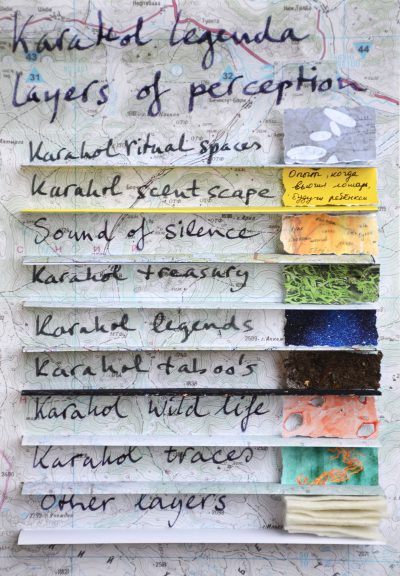
De tentoonstelling met The Landscape Speaks was te zien in Arti et Amicitiae in Amsterdam. Van 27 juli t/m 26 augustus 2018
for english see below
The Landscape Speaks (2016-2017) In Siberië deed ik research, uitgenodigd als lid van een internationaal onderzoeksteam, naar de manier waarop de Altaj hun landschap bezien. De Altaj is een bevolkingsgroep die leeft, dichtbij het vierlandenpunt tussen Rusland, Kazachstan, China en Mongolië. Doel van de expeditie was het met elkaar verbinden van de wetenschappelijke en de lokale kennis over het landschap waarin de Altaj leven. Ik bracht de verschillende lagen van het landschap in kaart: mythologische, persoonlijke, ecologische en geografische betekenissen van dit gebied. De betekenis van het landschap voor de bewoners kwam naar voren, hun manier van denken, respect voor de natuur.
Het onderzoeksteam bestond uit schrijfster Arita Baaijens, Bas Pedroli, landschapsecoloog van de Wageningen UR en de Russische wetenschappers Danil Mamjev (geoloog) en Maya Petrovna (antropoloog). In 2017 presenteerden wij The Landscape Speaks in Pakhuis de Zwijger in Amsterdam. Met een discussie met Matthijs Schouten, ecoloog en filosoof en Erik de Jong, landschapshistoricus en het publiek over de houding van de Altaj in Siberië tegenover het landschap en wat dat in Nederland betekent.
The Landscape Speaks is a mapping pilot in the Karakol Valley, a 40 km long wrinkle in the Altai Mountains in the very centre of Asia. Situated in Russia, it is connected with Altai traditions in nearby Kazakhstan, China and Mongolia as well. The Landscape Speaks is an initiative of Arita Baaijens with Slow Research Lab.
In August 2016 the seminar “Karakol Valley – The Landscape Speaks” took place to study this landscape from within. Participants from the valley took the effort to leave their hay making for a moment and join a few foreigners (writer Arita Baaijens, Bas Pedroli, landscape ecologist and Marjolijn Boterenbrood) in carefully observing their own Karakol landscape. In a few days we collected an astonishing amount of observations, stories and objects, and tried to exercise in ‘close reading’ which character of the Karakol Valley emerged from this rich material.
Various layers of perception can be identified in the Karakol landscape, that can be represented by many thematic maps. Every map shows a new perspective, reflects a further layer of perception.
This booklet and maps are an interpretation of (a small part) of the material that has been collected and of the work done, it is meant as an impulse for the further exploration of the values of the Altai landscape, in particular the Karakol Valley. Thanking the Altai people for their hospitality and for sharing their stories with us, we hope it can help strengthening the Altai identity and the development of the precious Karakol landscape.
This project is made possible by WWF an the Iona-Stichting
Participants of the Seminar ‘The Landscape Speaks’ in august 2016 in the Karakol valley:
Dr. Chochkina Maya Petrovna, of the Altai University in Gorno-Altaisk. Expert culturel meaning and ritual use of flora and fauna in the Altai
Kydyeva Oksana Vladimirovna, interpreter and Altai-specialist
Tadyrova Lyubov Michaylovna, psychologist and teacher in the Karakolvalley
Tokhtonova Marina Michaylovna, inhabitant Karakolvalley, employee etnografic museum in the Karakolvalley
Toziyakova Irina Aleksandrovna, interpreter and Altai-specialist
Unukov Anatoliy Makovich, advisor of Danil Mamyev
Dr. Zhernosenko Irina Aleksandrovna, Barnaul University, Filosofy, advisor of Uch Enmek Naturepark
Marjolijn Boterenbrood, artist, artistic research resulting in cartografy of specific places.
Mamyev Danil Ivanovich, geologist, founder and directeur of Uch Enmek Naturepark (Karakolvallei), founder studycentre AruSvaty, host seminar
Dr. Bas Pedroli, landscape-ecologist universitety of Wageningen.
Wayne Poulsen, architect, artist, participant in programs with native and herding communities of Central Asia
Organising team
-Drs. Arita Baaijens, biologist, writer and Altai-specialist Initiative, projectleader
-Prof. Yuri Badenkov, geologist, Russian Academy van Science
-Prof. Matthijs Schouten, biologist, filosopher, university van Wageningen

